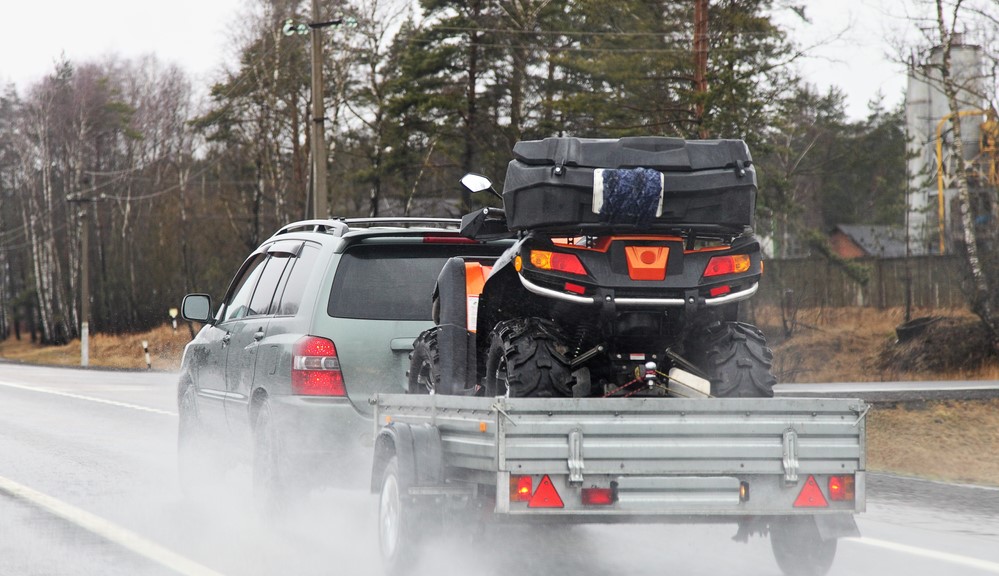Road trips with friends and family create unforgettable memories, especially when you bring along your favorite toys. Whether you're packing your travel trailer with little luxuries or hitching up a fishing boat for a lakeside getaway, it's essential to brush up on your towing skills. Towing incorrectly can harm your vehicle's brakes, suspension, tires, transmission, and alignment.
Always consult your owner's manual before hitching up and embarking on your journey.
Ensure Your Vehicle is Ready For The Challenge: Know Your Towing Capacity
Ever hurt your back lifting a hefty box? The same can occur to your car. Overloading it, or towing something it wasn't designed for, can lead to damaged wheel bearings, brakes, transmission, engine, and axles.
Determine your vehicle's towing capacity, which is the maximum weight you can tow without causing damage or affecting your ability to handle the car safely. You can find this information in your owner's manual or on the vehicle manufacturer's website.
Verify Your Equipment: Is Your Gear Suitable for The Size and Weight of Your Load?
Four primary pieces of equipment are usually needed for towing: the hitch, hitch receiver, drawbar, and hitch ball. These components work together to securely connect your vehicle and its trailer, preventing them from separating on the road.
-
The hitch, attached directly to your vehicle, creates the connection between the car and the trailer. With over ten hitch types available, choose the one that suits your vehicle and maximum tow weight.
-
The hitch receiver serves as a base for the other elements and comes with different load ratings.
-
The drawbar, a smaller tube threading through the receiver and connecting to the hitch ball, comes in various heights to enable the trailer to follow on a level plane. To avoid searching for the right drawbar each time, consider purchasing an adjustable one.
-
The hitch ball is available in multiple sizes and weight capacities.
Remember, not all towing gear is equal. The equipment you used last year to tow a moving trailer might not be suitable for this year's mini-camper. Consult the manufacturer's towing guide and your owner's manual for advice on choosing and assembling your towing equipment.
Pay Attention to The Details: Have You Taken All Necessary Safety Precautions?
Once you've connected the trailer, give yourself a pat on the back and prepare for a safety check!
-
Cross chains under the hitch, from side to side, forming an X. This extra support can prevent your trailer from crashing into a guardrail or another vehicle if the hitch comes loose.
-
Connect the trailer lights. Since your taillights and brake lights will be obscured, most trailers come with trailer signal wiring. After connecting the electrical wires, the trailer lights will mimic your regular tail lights. Double-check everything is set up correctly before leaving.
-
Secure your cargo. As you'll be traveling at highway speeds, fasten a tarp over items that may fly away and use bungee cords to hold things that could break inside the trailer.
-
Adjust your driving style. Towing requires slower acceleration, braking, turning, lane changes, and cornering. Be prepared for more frequent fuel stops, as the extra load will reduce your fuel economy.
-
Review local laws. Each state has different regulations for towing a trailer. At the very least, working taillights and brake lights on the trailer are required. Many states also mandate that trailers be registered with their Department of Motor Vehicles.
-
Inspect your tires — ALL OF THEM! Regularly checking your tires is crucial, especially when towing a trailer. A flat tire or blowout on either the trailer or your vehicle could be particularly hazardous. Make sure all tires (including the trailer's) are inflated according to the manufacturer's guidelines before setting off, and keep an eye on them throughout your journey. Over- or under-inflated tires can reduce brake effectiveness and cause the trailer to sway.
Before embarking on your next exciting adventure with a trailer, camper, or boat in tow, ensure your vehicle is in excellent condition. Existing brake issues, transmission problems, worn tires, or improper wheel alignment can all lead to disaster on the road. The added weight from the trailer and its cargo can make a collision, or blowout, even more dangerous.
For another example with how to hook up a trailer, check out our tutorial we made just for you! Click here to watch.
Our professional technicians at your nearest Kunes Service Center can inspect your vehicle and inform you of any issues that could impact your ability to tow safely. Visit your local Kunes Service Center or schedule an appointment with us online!



